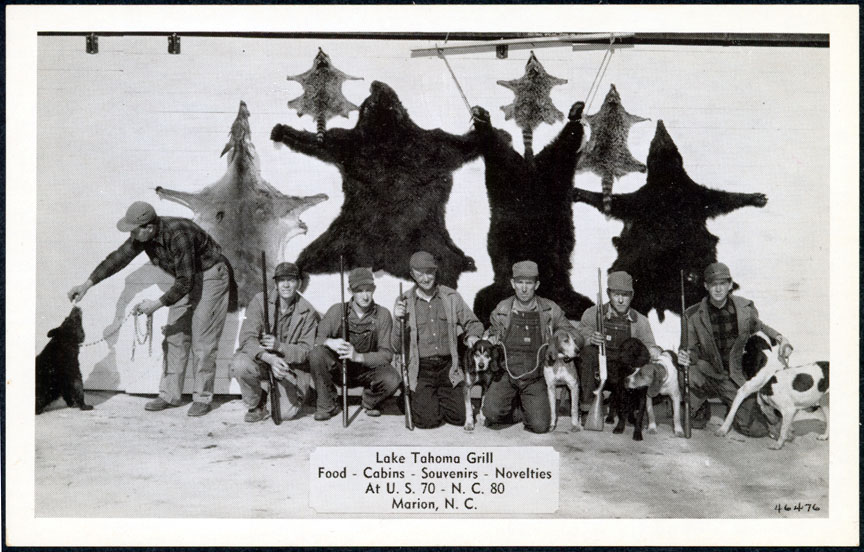“Several hunters phoned in last week asking for taxidermy information,” the Sunday edition of the Asheville Citizen-Times reported on Nov. 27, 1955. Unfortunately for these callers, the paper continued, “There are few taxidermists in Western North Carolina.”
At the time, Leland J.W. Jones was the leading expert in the field. Formerly of Rochester, N.Y., he and his family arrived to Asheville in 1932.
According to local reports, Jones suffered chronic health problems. Nevertheless, his talent as a taxidermist kept him in high demand. “In spite of the fact that his health has kept him under wraps for many months now, he is still besieged by those who want him to preserve in lifelike appearance prize specimens of game and fish, they have killed or caught,” the Sunday edition of the Asheville Citizen-Times wrote on Oct. 11, 1953. “He manages to handle some of this work with the aid of an assistant.”
But by early spring 1955, the paper reported that Jones was no longer accepting projects. The news arrived in the midst of the latest fishing season. For fishermen seeking to stuff their catch, Jones offered tips for outsourcing the job (or as the paper put it, “[a] recipe for mailing or expressing a fish”). In short, Jones noted that a frozen fish faired far better on the road than a fish transported otherwise.
The retired taxidermist continued to offer pointers that fall, as the deer hunting season commenced. In the Nov. 27, 1955, paper he shared best practices for preserving trophies. The sooner a deer could be delivered to a taxidermist the better, Jones wrote. Showing a wry sense of humor, he continued, “Where this is impossible, fill mouth (deer’s), with salt. Place several handsful inside skin at base of skull, salting rest of skin heavily before expressing in a burlap bag with antlers showing.”
Asheville received promising news the following year. On Dec. 9, 1956, the paper reported of Jones’ plan to mentor James “Ralph” Nelson of Arden. “Jones and Nelson have plenty of deer heads and bear skins, supplied by local hunters, to keep them busy while the cold winter months roll away,” the article read.
“Nelson, who is rapidly mastering the secrets of taxidermy, is undecided whether to go to work for Jones or open his own shop at the end of his study,” the paper continued. “One way or the other, we’ll have a full-time practicing taxidermist in Western North Carolina.”
Jones died less than two years later, on March 20, 1958.
Nelson’s early promise as Jones’ replacement does not appear to have panned out. His name is unmentioned in future articles lamenting the city’s ongoing need for a taxidermist. However, Nelson’s obituary, featured in the Dec. 8, 1999, edition of the Asheville Citizen-Times suggests otherwise. It notes that the late Nelson, a lifelong resident of Buncombe County, was a self-employed handyman and taxidermist.
If Nelson was indeed actively working as a taxidermist in the late 1950s, it appears his services escaped many of the city’s residents. One piece of evidence includes a reader’s write-in to the paper on March 5, 1959. Offering only her initials, Mrs. S.L. penned the following message and request:
“I am devoted to a pet skunk but am unable to care for him any longer. Even though he’s fairly young and has been ‘de-odorized’ I have decided to have him put to sleep and stuffed.
I wonder if anyone can tell me where I can find a taxidermist?”
Editor’s note: Peculiarities of spelling and punctuation are preserved from the original documents.




Before you comment
The comments section is here to provide a platform for civil dialogue on the issues we face together as a local community. Xpress is committed to offering this platform for all voices, but when the tone of the discussion gets nasty or strays off topic, we believe many people choose not to participate. Xpress editors are determined to moderate comments to ensure a constructive interchange is maintained. All comments judged not to be in keeping with the spirit of civil discourse will be removed and repeat violators will be banned. See here for our terms of service. Thank you for being part of this effort to promote respectful discussion.